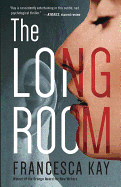
The Long Room is spy fiction drained of every drop of romanticism, in the storied tradition of John le Carré's understated masterworks and the dark psychological intensity of Coppola's The Conversation. Francesca Kay's novel burrows so deeply into her protagonist Stephen Donaldson's psyche that his warped perspective can be frighteningly persuasive. Stephen works for a secretive U.K. government agency known as the Institute, which seems primarily to engage in domestic espionage. The novel takes place in November 1981, as IRA bomb attacks wreak havoc and the United Kingdom stumbles toward war in the Falklands. The titular "long room" refers to the drab office space where Stephen and his colleagues listen to tapes of tapped phone calls and bugged residences.
Stephen's monotonous, lonely world is interrupted by his increasing obsession with Helen, the wife of one of his surveillance targets. Stephen begins to imagine an exaggeratedly romantic relationship between them: "With her, and only with her, he feels no need to pretend, he is at ease in his own skin, he begins to like himself. She gives him back his truthfulness and when he thinks of her he thinks in poetry." Kay purposefully blurs the line between spook and stalker, raising troubling questions about the ethics of intelligence work.
More than anything else, The Long Room is a deep and absorbing character study. Stephen's self-justifying fantasies and solipsistic outlook can be almost as alluringly deceptive as Humbert Humbert's. The Long Room is a striking and particularly satisfying work of espionage fiction. --Hank Stephenson, bookseller, Flyleaf Books

